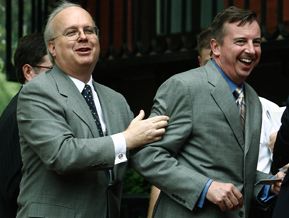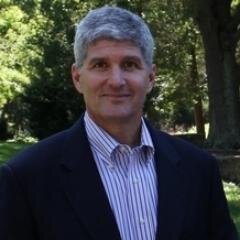
Leading GOP Senate Candidate Ed Gillespie
ANALYSIS: Gillespie remains the candidate to beat, but can he close the deal with the GOP base?
Now that the filing deadline has passed, GOP activists across the Commonwealth will soon start registering as delegates to choose from among a field of four candidates at the Republican Party of Virginia’s 2014 Convention in Roanoke on June 7. This post is an attempt at dispassionate analysis for the benefit of other Republicans who might not yet be following the race closely.
For the foreseeable future, there are only really two candidates with an appreciable impact on the race, Shak Hill and Ed Gillespie. (See our take on the two newer entrants to the race, Tony DeTora and Chuck Moss, here: Who are the Newcomers to the U.S. Senate Race?).
The key dynamic in this contest–the one that everyone’s talking about privately–is the extent to which GOP rank and file are willing to back the strong horse in the race, former RPV and RNC Chairman Ed Gillespie. Conventional wisdom says that this is Gillespie’s race to lose, given his ability to fundraise, his previous experience in Virginia Republican politics, his so-far nearly flawless campaign, and the national stature that gives him immediate credibility in a race against incumbent Democrat Mark Warner.
In a state-run primary, where the impact of “high information” voters is diluted, Gillespie would be walking away with the nomination. However, as it is, with Republicans having chosen a Convention to nominate their Senate candidate, Gillespie first has to convince a majority of the Republican activist base that he merits their support. This requires a commitment to a grueling pace of intensive one-on-one and small group interactions with grassroots leaders—essentially a “retail” campaign at a statewide level.
Challenges for Ed Gillespie. So far, Gillespie has demonstrated an understanding of what needs to be done, and an eagerness to engage with potential delegates. But, from our vantage point, it appears he is facing persistent uneasiness with his candidacy among a sizable segment of the GOP base. Many grassroots leaders appear to be riding the fence, unwilling to climb down on either side for Gillespie or his chief rival, Fairfax businessman Shak Hill. “People want to support a unity candidate, someone everyone can support [and] who can beat Mark Warner, but they’re just not convinced yet that Ed’s that guy,” one prominent GOP leader told The Bull Elephant. “He can probably win in November, but the big thing is whether there is anybody else more conservative who can win, too,” said this chairman, who asked not to be identified.

Gillespie Must Separate Himself from Karl Rove
That said, the current picture isn’t exactly gloomy for Gillespie. To the contrary. His efforts have yielded a great deal of support, including among many of the most conservative GOP leaders. He has scored endorsements from two of Virginia’s three representatives on the Republican National Committee (Morton Blackwell and Kathy Terry), as well as from some others in senior party leadership positions. Former 2013 Attorney General candidates Del. Rob Bell and Sen. Mark Obenshain, both immensely popular among the grassroots, have each endorsed Ed, as have former Lieutenant Governor candidates Pete Snyder and Sen. Steve Martin. Gillespie tells The Bull Elephant that he has recorded great fundraising numbers in his first few weeks of actively campaigning, and that he’s committed to the retail-level politicking required to mount an effective Convention strategy.
Gillespie says his efforts are paying off. “This is really my first chance in political life to talk about what I believe,” he said, drawing a contrast between his roles as presidential advisor or party chairman, and his role as his own candidate. “I’m going to continue talking with the grassroots every chance I get,” said Gillespie, who also said he’s having success reaching all parts of the GOP coalition, including liberty movement and Tea Party activists.
Opportunity for Shak Hill. Hill, a Fairfax-based financial planner with an impressive personal story, has been unable so far to gain durable traction in his uphill race for the nomination. But, the base hasn’t written him off yet, and appear to be waiting to learn more about this man who remains relatively unknown beyond Fairfax and Loudoun counties.

Shak Hill, Candidate for the GOP 2014 Nomination for U.S. Senate
However, the entry of two new and unknown candidates, Tony DeTora and Chuck Moss, is not helpful to Shak Hill. Already behind Gillespie in fundraising, endorsements, and field organization, Hill now has to contend with being lumped in as one of the “three lesser known” candidates running behind the high-profile Gillespie. Hill’s challenge in the next couple of weeks will be to achieve two things in as high-profile a way as possible: (1) preserving his stature next to Gillespie by clearly distinguishing himself from the newer candidates; and (2) making one or two high-impact moves that could have some chance of arresting the momentum building behind Ed Gillespie.
Ed’s “Ace in the Hole.” Shak Hill’s biggest obstacle to winning in June is the perception that he’s not as strong a candidate as Gillespie to take on Warner. While the “electability” question is always relevant, it has a particular salience this year, following the Democrat clean sweep of statewide elections in 2012 and 2013. Stated plainly, conservatives are tired of losing, and this year many of them appear amenable to a greater degree of ideological flexibility than usual if it means the GOP can win the election.
Right or wrong, many of these activists have internalized criticism of the Convention process that yielded E.W. Jackson as the party’s Lieutenant Governor nominee last year, and appear open to supporting an “establishment” candidate instead, provided they can become comfortable with him, even if they’re not particularly enthusiastic.
This is why, in the coming weeks, Gillespie will focus on burnishing his conservative credentials. Together with more endorsements and organizational help from conservative leaders, this will help him comfort potential delegates that they can have their cake (i.e., a reasonably conservative candidate) and eat it too (i.e., ride Gillespie’s superior organization and fundraising to victory in November). Meanwhile, Shak Hill will focus on demonstrating his electoral viability against Mark Warner, hoping to attract undecideds who are still shell-shocked from recent defeats by convincing them that they don’t have to sacrifice their principles to win.
Gillespie is not taking his lead for granted, and cannot ever rest on the belief that his nomination is inevitable. It’s not…anything can happen at a Convention. But the strongest campaigns are those that identify and recruit delegates in advance. To do that, Hill needs to quickly show that he’s got the intellectual, fundraising, and organizational firepower to make that happen—and punch a hole in the perception of Gillespie’s inevitability—or his natural base of support may quickly begin to throw in with Gillespie, one local mass meeting at a time.
Stay tuned.
